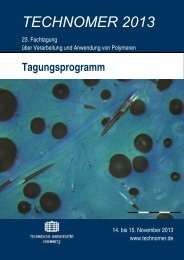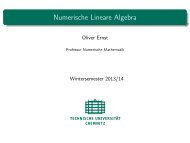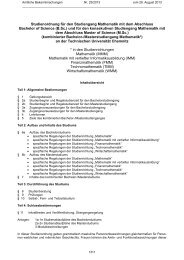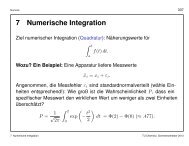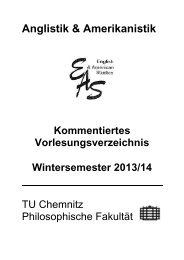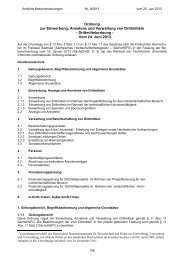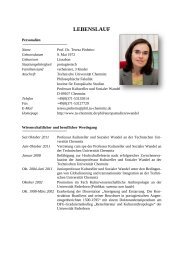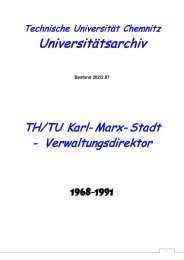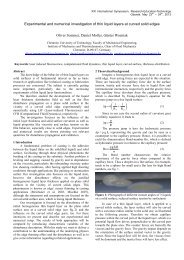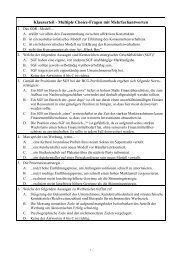2.3 David Ricardo: Profitrate und Kapitalakkumulation Die Klassik ...
2.3 David Ricardo: Profitrate und Kapitalakkumulation Die Klassik ...
2.3 David Ricardo: Profitrate und Kapitalakkumulation Die Klassik ...
Erfolgreiche ePaper selbst erstellen
Machen Sie aus Ihren PDF Publikationen ein blätterbares Flipbook mit unserer einzigartigen Google optimierten e-Paper Software.
14 Fritz Helmedag<br />
Anstieg des Weizenpreises gleichfalls erhöhen, denn der Wert der Nicht-<br />
Weizen-Inputs gehe relativ zum Weizenwert zurück. Demgemäß wachse<br />
sowohl der Gewinn – die Differenz zwischen Erlösen <strong>und</strong> Kosten – als<br />
auch die <strong>Profitrate</strong>, da deren Zähler größer <strong>und</strong> ihr Nenner kleiner werde<br />
35 .<br />
Obwohl <strong>Ricardo</strong> zunächst bemüht war, mit einer sich auf sein Weizenmodell<br />
stützenden Beweisführung dagegenzuhalten, erkannte er sofort<br />
die Stärke des Arguments an: „Your statement is however very ingenious,<br />
and carries a great deal of plausibility with it …“ 36 Im Herbst teilt<br />
er, fast etwas verzagt klingend 37 , Trower mit, der Dissens zwischen Malthus<br />
<strong>und</strong> ihm sei nicht ausgeräumt. Immerhin verleiht er der Hoffnung<br />
Ausdruck, in absehbarer Zeit eine revidierte Fassung seiner Theorie vorlegen<br />
zu können:<br />
„… my opinions differ from the great authority of Adam Smith Malthus,<br />
&c·a that I should wish to concentrate all the talent I possess, not<br />
only for the purpose of establishing what I think correct principles but<br />
of drawing important deductions from them. For my own satisfaction I<br />
shall certainly make the attempt, and perhaps with repeated revisions<br />
during a whole year or two I shall at last produce something that may<br />
be <strong>und</strong>erstood.” 38<br />
Malthus, Th. R., Brief an <strong>Ricardo</strong>, 5. August 1814, in: The Works …, Bd. VI,<br />
a.a.O., S. 115-118, S. 117.<br />
35 Vgl. das Zahlenbeispiel in: Malthus, Th. R., Brief an Horner, 14. März 1815, in:<br />
The Works …, Bd. VI, a.a.O., S. 186-188, S. 187. Dort kommentiert Malthus <strong>Ricardo</strong>s<br />
exemplarische Rechnung im “Essay”: „The fault of Mr. <strong>Ricardo</strong>'s table<br />
which is curious, is that the advances of the farmer instead of being calculated in<br />
corn, should be calculated either in the actual materials of which the capital consists<br />
or in money, which is the best representative of a variety of commodities. The view<br />
I have taken of the subject would greatly alter his conclusions.” Ebenda, S. 187 f.<br />
36 <strong>Ricardo</strong>, D., Brief an Malthus, 17. März 1815, in: The Works …, Bd. VI, a.a.O.,<br />
S. 192-194, S. 192.<br />
37 „… never shall I be so fortunate however correct my opinions may become as to<br />
produce a work which shall procure me fame and distinction.” <strong>Ricardo</strong>, D., Brief an<br />
Trower, 29. Oktober 1815, in: The Works …, Bd. VI, a.a.O., S. 314-317, S. 315.<br />
38 Ebenda, S. 316.



